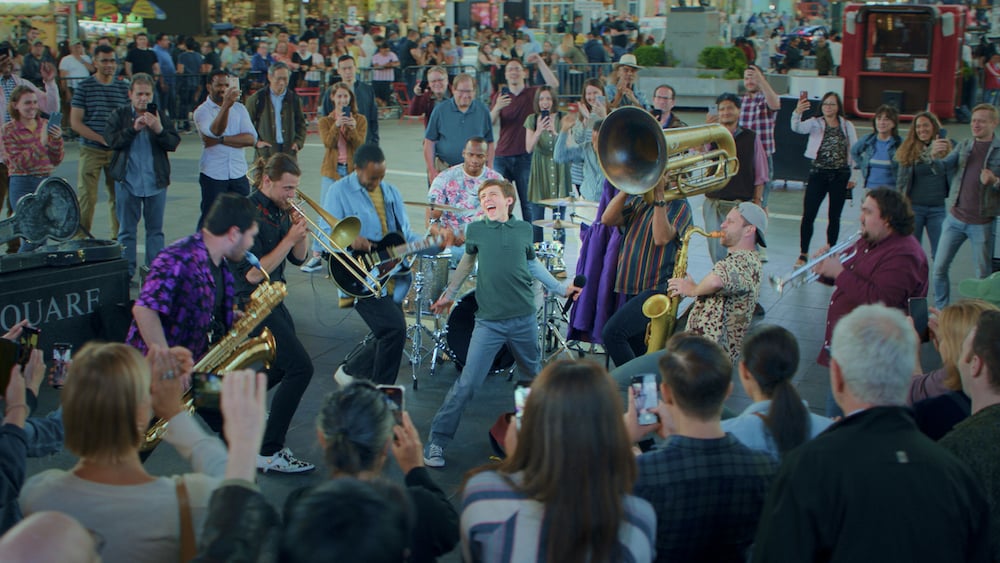What hooks and disarms audiences minutes after clicking play on “Better Nate Than Ever” is its infectious energy. George Benson’s funk cover of “On Broadway,” used decades earlier in “All That Jazz,” makes for a lively introduction to a spirited, small-statured youth’s big personality. Writer-director Tim Federle welcomes us into this world with the tantalizing promise of major things to come in a semi-biographical tale of an underdog chasing his dream of becoming a Broadway sensation. But before that can happen, a series of hapless, comedic misadventures has to occur. Funny, vibrant, yet schmaltzy to a fault, this Disney Plus family film can carry a tune, but falters in crafting a runaway hit.
Thirteen-year-old Nate (Rueby Wood) loves musicals. That much is clear from the “Music Man” and “Redhead” posters that line the walls of his bedroom and the “Wicked” references he drops in casual conversations with cool-tempered best friend Libby (Aria Brooks). He even keeps a bucket list that features climbing down a fire escape like in “West Side Story.” He lives and breathes Broadway, which annoys his older jock brother Anthony (Joshua Bassett) and dad Rex (Norbert Leo Butz), though his frazzled working mom Sherrie (Michelle Federer) tolerates it. However, our hero begins to spiral when, due to never having headlined a musical before, he’s passed over for the lead role in his middle school’s upcoming stage show.
Hoping to quell her bestie’s angst, Libby suggests Nate audition in the open casting call for a new musical based on “Lilo & Stitch.” At first reluctant to travel as unaccompanied minors to Manhattan, Nate reconsiders once the opportunity of a lifetime arises: His parents are going on a weekend trip and Anthony will be gone overnight at a track meet. Under the guise of sleeping over at Libby’s, the pair hightail it to New York City. Once there, they must contend with a few conundrums, like navigating demanding tryouts and attempting to rope Nate’s estranged cool Aunt Heidi (Lisa Kudrow), a struggling actress, into their scheme. Their situation is further complicated when Nate gets an unexpected callback, leaving the two at a crossroads in their friendship.
Though the title touts a singular protagonist, and his struggles do take narrative priority, the film also builds out Libby into a three-dimensional character, giving her well-conceived conflicts and clever, clearly-defined stakes, which Brooks plays with assured aplomb. Initially, it seems her character’s purpose is both to aid the male arc and to represent a series of sticky tropes. But midway through, her identity blossoms and begins thriving, blessedly uprooting any preconceived notions of the character’s development. The end credits finale, which utilizes rousing, radio-friendly single “About to Go Awf” sung by Brooks and Wood, vacuum-seals the duo’s rootable interests.
That said, Federle struggles to flesh out other character conflicts properly, most notably the familial drama between Sherrie and Heidi, who’ve let a long-standing feud fracture their sisterly bond. Both pay lip service to it in clunky expository speeches that conveniently arise. While the emotional pull is full of poignant commentary that spite, jealousy and regret lead to major misunderstandings, the film has trouble making this land in the third-act climax. Any resolution is handled off-screen by the time the closing credits run and a reconciliatory hug comes. Other conflicts are forgotten about completely. The father-son strife and cavernous distance between Rex and Nate, lightly hinted at early on, are nonexistent by the climax — though there was no opportunity for either to heal from their division. It’s left aching, as Wood and Butz are capable performers who could land the drama.
Visually, there are many highlights. Federle and editor Katie McQuerrey show great craft and care instilling the picture with a snappy sense of brightness and flexibility. Quick cuts and whip pans help to convey the perspective of the perky protagonist. The filmmakers have clear gifts for mining the most out of a scene’s comedic timing. Transitions between sequences that get the characters from point A to point B (like getting to school, New York City and the Natural History Museum) spotlight a witty visual dexterity, while Declan Quinn’s saturated cinematography shows notable depth. Nate’s grandiose “Guys and Dolls”-inspired dream sequences and fantastical asides are polished and pristine. Handheld camerawork during Nate’s first audition adds to the immediacy, speaking to the pressure he’s feeling. Camera positioning and framing, specifically when Nate feels intimidated, also aesthetically augment the subtext.
As far as sentiments go, the film’s heart is in the right place. It’s LGBT-positive in terms of representation and acts as a love letter to musical artistic expression. Taking a few tonal cues and ingredients from “Ferris Bueller’s Day Off” and “Billy Elliot” helps guide the narrative without becoming a reductive rehash. Its heaping doses of sincerity make platitudes about finding your light and being true to yourself go down easy, giving hope to those who may be struggling with self-acceptance. Still, without some of the bigger ideas combining perfectly into a powerful crescendo, the song it sings sounds pitchy.
Love Film & TV?
Get your daily dose of everything happening in music, film and TV in Australia and abroad.
From Variety US































